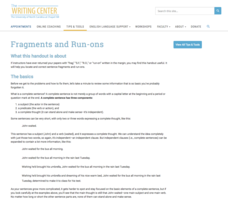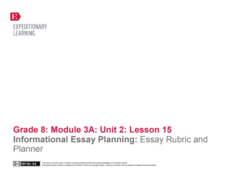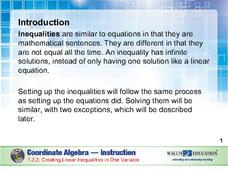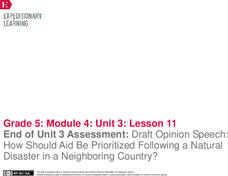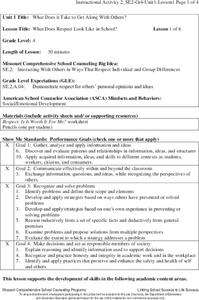Houghton Mifflin Harcourt
Family and Friends: English Language Development Lessons (Theme 4)
Family and Friends is the theme of a unit consisting of English language development lessons. Reinforce language proficiency, particularly in family vocabulary, basic needs, feelings, short vowel sounds, blending, reading high frequency...
Houghton Mifflin Harcourt
Special Friends: English Language Development Lessons (Theme 9)
Enhance language proficiency with a Special Friends themed English language development unit. Each lesson follows a listen, speak, move, and/or look routine that is guaranteed to get your scholars discussing topics such as animal...
EngageNY
Discussing and Identifying Themes: What Makes a Good Children’s Book?
Working in small groups, scholars look closely at a children's book to evaluate narrative techniques. Next, they complete a Children's Book Scavenger Hunt worksheet to analyze the literary elements of their selected stories.
Curated OER
Sentence Structure: Sentence Types
Sixth graders identify parts that make up different types of sentences with a grammar presentation. The last few slides prompt learners to complete 10 exercises in which they indicate whether each sentence is simple, compound,...
K12 Reader
Identify the Antonym
What happens to a sentence when you replace a word with its antonym? A two-part instructional activity asks learners to select words opposite in meaning to provided words, and then to craft sentences using antonyms for given words.
Curriculum
Expository Writing
The beauty of the way this expository writing resource is structured is that the units can be presented as a complete writing workshop or sequenced throughout a course of study
University of North Carolina
Fragments and Run-ons
English teachers around the world cringe when they come across fragments and run-ons in papers. A handout on these poor imitations of sentences helps bring relief by reviewing the basics of sentence construction and by offering...
Houghton Mifflin Harcourt
Nature Walk: English Language Development Lessons (Theme 2)
Walking in nature is the theme of a unit designed to support English language development lessons. Scholars look, write, speak, and move to explore topics such as camping, woodland animals, instruments,...
Grammaropolis
Grammaropolis - Complete Edition
Allow the residents of this grammar-packed city to teach your pupils the parts of speech with songs, videos, quizzes, and more. Kids can get to know each part of speech and sing along with the catchy tunes!
Curated OER
Grammar Lesson Plan: Simple Past vs. Present Perfect
What's the difference between the present perfect and simple past? Have your class practice identifying and using both of these verb tenses through pair activities, whole-class discussion, and a worksheet.
K12 Reader
Identify the Synonym
Readers are asked to select the correct synonym for the underlined words on this 10 sentence, multiple choice worksheet.
EngageNY
Informational Essay Planning: Essay Rubric and Planner
Pupils walk through the process of writing essays for their final assessment of Unbroken. They begin by reviewing the rubric using Rubric Criteria strips that assign a portion of the rubric to each pair of learners. They then participate...
British Council
Class Journals
Who are you? Scholars draw a shield on the front of their journals that includes four items with which they identify and discuss them with a partner. Readers then use topic suggestions from the board to write about themselves on the...
Teach It Primary
The Pied Piper of Hamelin
Six tasks make up a lesson plan designed to reinforce comprehension and language skills using the poem "The Pied Piper" by Robert Browing. Scholars discuss and define unknown words, identify adjectives and onomatopoeia, review...
Amazon Web Services
Idiom Dictionary
Examining idioms is a peace of cake when using this graphic organizer! Here, grammarians identify an idiom and use it in a sentence. Then they investigate its literal meaning versus its figurative meaning, and accompany each one with a...
Curated OER
Vocabulary Instructional Routine: Synonyms
Young scholars work with word cards to define and identify synonyms, antonyms, and homophones. Participants listen to instruction, read word cards, discuss their new-found knowledge, and put it into action by creating sentences and...
BW Walch
Creating Linear Inequalities in One Variable
Just when a young mathematician starts to feel comfortable turning word problems into linear equations, shake things up and throw inequalities in the mix. This excellent, instructive presentation takes the steps for solving an...
University of Hawaiʻi
Verb Tense Review: the Importance of Time
When you ask a fourth grader to write a sentence in the past perfect progressive tense, there might be some confusion. But with a presentation that features several different verb tenses, along with examples and a handy timeline, your...
EngageNY
End of Unit 3 Assessment: Draft Opinion Speech: How Should Aid Be Prioritized Following a Natural Disaster in a Neighboring Country?
Put it to the test. With the cumulative resource, pupils complete the End of Unit 3 Assessment. Using everything they've learned in the unit, they write a draft of an opinion speech about how to prioritize aid after a natural...
Rational Number Project
Initial Fraction Ideas Lesson 9 Overview
Visual models support young mathematicians with exploring equivalent fractions. Starting with a quick warm-up problem, children go on to work through a series of guiding practice problems before working with a partner identifying and...
EngageNY
Presentation of Events: Comparing Two Authors
Give a little clue! Readers learn how context clues can help them determine the meaning of words by viewing a Context Clues Resource sheet then completing a Context Clues
practice sheet. They then compare events presented by two...
Missouri Department of Elementary
What Does Respect Look Like in School?
What does it mean to be respectful? Scholars complete a self-assessment worksheet to determine just how respectful they are. Next, they choose three items from the survey and write plans for how to improve in those areas.
Workforce Solutions
Workforce Solutions K-1 Lessons
Three lessons and one at-home connection explore 12 professions. In the first lesson, scholars examine an online map that displays all 12 careers alongside a video. Lesson two challenges class members to choose two of those careers to...
Houghton Mifflin Harcourt
We Can Do It!: Extra Support Lessons (Theme 10)
Scholars participate in chants, grand discussions, and complete practice pages in a We Can Do It! themed unit. Designed to provide extra support, the assortment of lessons cover topics such as r-controlled vowels, comparatives...






